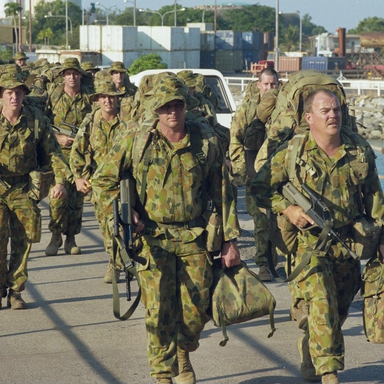Australians at war: push to honour modern Diggers
A six-volume official history of Australia's recent war service will be written on our involvement in conflicts in East Timor, Iraq and Afghanistan, after the Federal Government gave $8.7 million to fund the project.


By KATE MANI
An official history of Australia's recent war service will be written, after the Federal Government gave $8.7 million to the Department of Veterans Affairs to fund the project.
The Australian War Memorial will compile the six-volume document, which will outline military involvement in East Timor 1992-2012 and in Iraq and Afghanistan 2001-2014.
The War Memorial expects it will take seven years to complete, with extensive research and interviews with current defence personnel.
Minister for Veterans Affairs Michael Ronaldson, in a media release, said an official history would provide “a rich resource of educational and commemorative material for all Australians, for our veteran community, for schools, nursing homes and the general public”.
An officer who served in Afghanistan in 2014, and asked to be referred to as Lt-Col M, said she believed the project was necessary to show a different side of Australians in conflict.

“Media has focused on the negatives,” Lt-Col M said. “People’s perspective is that it’s horrible and we all come back with Post-Traumatic Stress Disorder (PTSD).”
She said while the effects of PTSD needed to be told, it was time to document the positive work of Australians who had held influential leadership positions in Afghanistan.
“This will serve towards Australia’s sense of pride,” Lt-Col M said.
The official history will also carry significant benefits for military strategy.
Returned and Services League (RSL) Victorian Branch president Maj-Gen David McLachlan said documenting how battles were executed would allow for important future discussion.
“The military train using … the principles of war,” he said. “You can draw lessons out of the way a conflict was actually conducted as to how well we adhered to those principles.”

Maj-Gen McLachlan said spending on the official history would not affect veterans’ healthcare funding.
War Memorial assistant director and branch head public programs Anne Bennie said she believed the compilation would help returning servicemen and women resettle into civilian life by showing that the Australian public recognised their service.
“In World War I there was a much more community-based response [to veterans returning from war],” she said. “We haven’t sent as many defence personnel to current conflicts so they may come home and feel marginalised, feel like no one cares,” she said.

“This takes us that step towards saying, ‘well, we do’."
Ms Bennie also said while the task fell under the Department of Veterans’ Affairs (DVA) portfolio, its content would not be government-controlled.
“We do see ourselves as independent. The manuscript is reviewed by government as per the Archives Act but it is not censored in any way,” she said.
* Home page image: Members of the 3rd Combat Engineer Regiment prepare for departure to East Timor in 1999. Picture: Australian War Memorial





